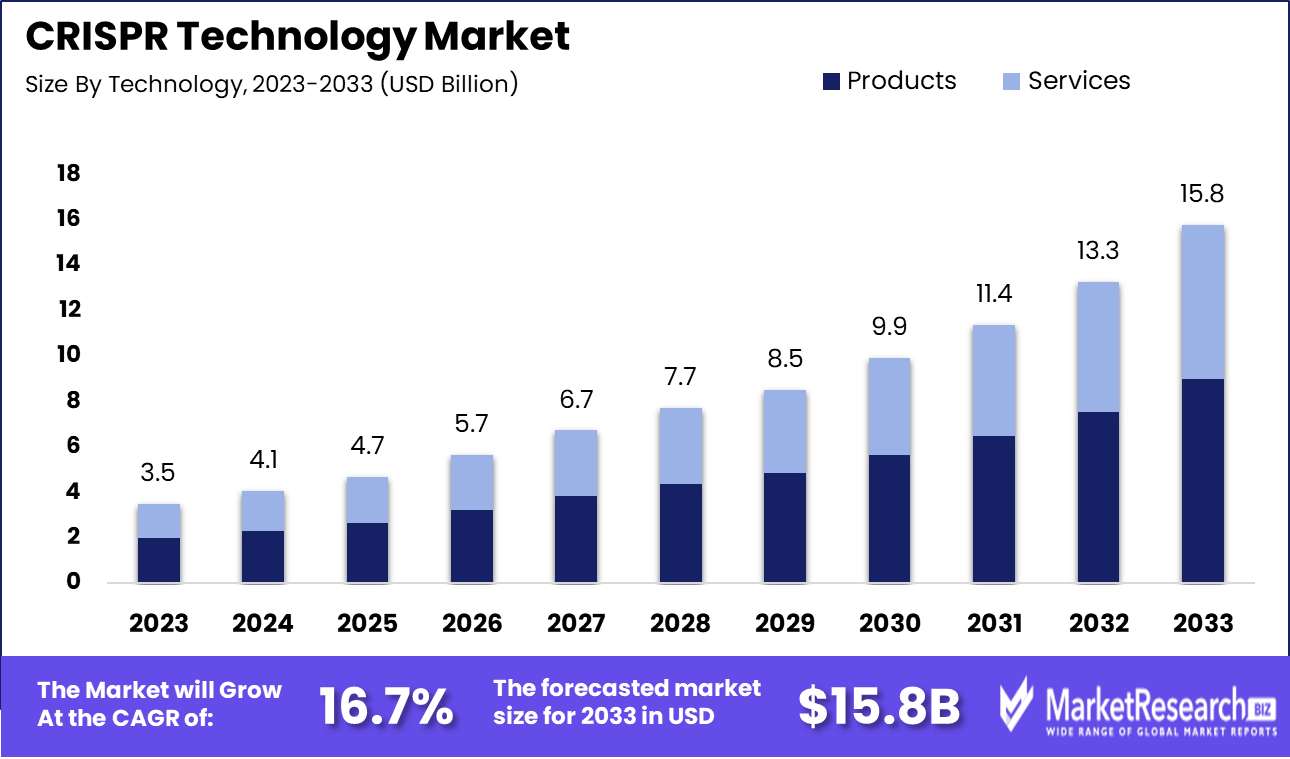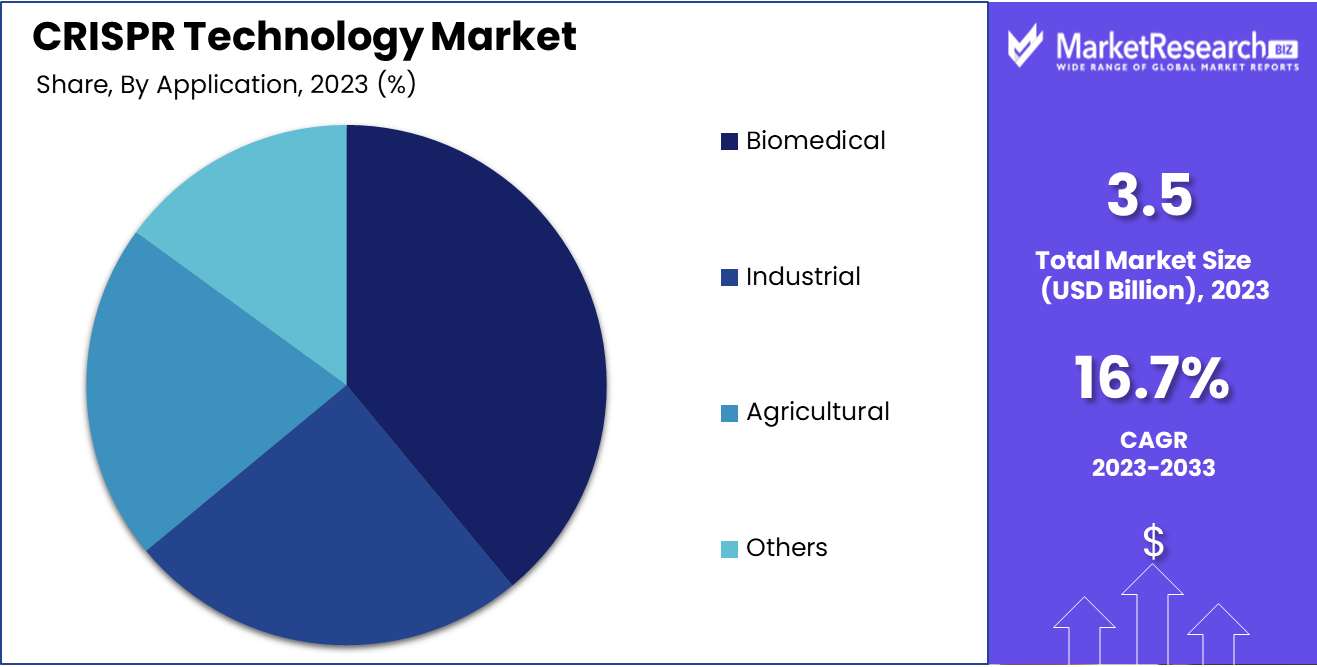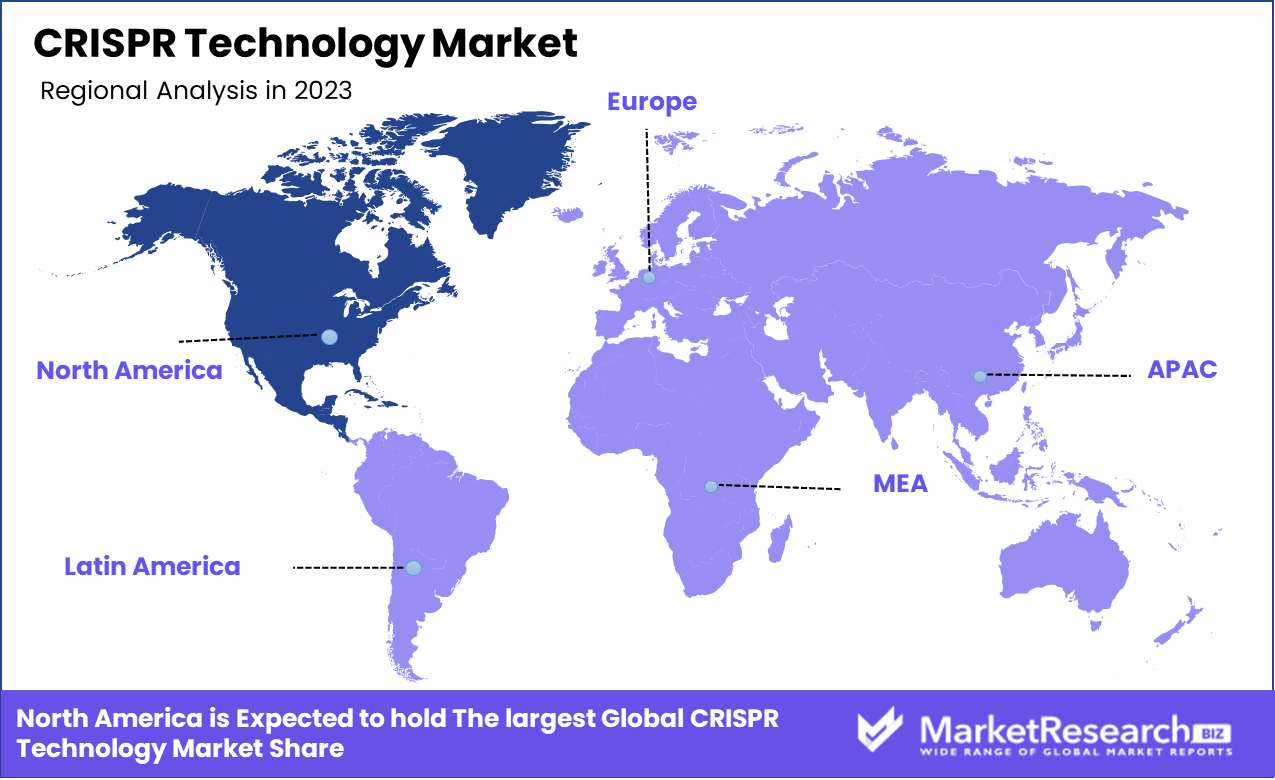
CRISPR Technology Market Technology Market By Product Type (Products, Services), By Application (Biomedical, Industrial, Agricultural, Other Applications), By End-User (Pharma & Biopharma Companies, Biotechnology Companies, Academic & Research Institutes, Contract Research Organizations), By Region And Companies - Industry Segment Outlook, Market Assessment, Competition Scenario, Trends, And Forecast 2024-2033
-
50576
-
August 2024
-
300
-
-
This report was compiled by Vishwa Gaul Vishwa is an experienced market research and consulting professional with over 8 years of expertise in the ICT industry, contributing to over 700 reports across telecommunications, software, hardware, and digital solutions. Correspondence Team Lead- ICT Linkedin | Detailed Market research Methodology Our methodology involves a mix of primary research, including interviews with leading mental health experts, and secondary research from reputable medical journals and databases. View Detailed Methodology Page
-
Quick Navigation
Report Overview
The CRISPR Technology Market was valued at USD 3.5 billion in 2023. It is expected to reach USD 15.8 billion by 2033, with a CAGR of 16.7% during the forecast period from 2024 to 2033.
CRISPR Technology Market refers to the rapidly evolving industry centered around CRISPR (Clustered Regularly Interspaced Short Palindromic Repeats) technology, a groundbreaking tool for precise gene editing. This market encompasses a broad range of applications, including genetic research, drug development, agriculture, and disease treatment.

The CRISPR technology market is poised for significant growth, driven by increasing demand for gene editing applications across various sectors, particularly in therapeutics. The ability of CRISPR-Cas9 to provide precise and efficient gene modification has revolutionized the field of genomics, opening new avenues for disease treatment and agricultural advancements. The expansion of CRISPR applications in therapeutics, including gene therapies for genetic disorders, cancer, and infectious diseases, is expected to be a major growth driver. Moreover, the market is benefiting from continuous advancements in CRISPR technology, such as the development of more accurate and versatile CRISPR systems, which are enhancing the potential for complex gene editing tasks.
However, the market also faces challenges, particularly concerning ethical and regulatory issues. The ability to alter human and animal genomes raises significant ethical questions, and the lack of a standardized global regulatory framework may hinder the market's growth. As CRISPR technology continues to advance, stakeholders must address these concerns through robust ethical guidelines and regulatory oversight. Despite these challenges, the potential of CRISPR in revolutionizing healthcare and agriculture cannot be understated. As the technology matures and regulatory pathways become clearer, the CRISPR technology market is likely to witness accelerated adoption, positioning it as a cornerstone of the future of biotechnology.
Key Takeaways
- Market Growth: The CRISPR Technology Market was valued at USD 3.5 billion in 2023. It is expected to reach USD 15.8 billion by 2033, with a CAGR of 16.7% during the forecast period from 2024 to 2033.
- By Product Type: CRISPR Libraries dominated the CRISPR Technology Market's Product segment.
- By Application: The Biomedical segment dominated the CRISPR Technology Market across diverse applications.
- By End-User: Pharma & Biopharma Companies dominate the CRISPR Technology Market, driving growth through R&D.
- Regional Dominance: North America dominates CRISPR technology with a 40% global market share.
- Growth Opportunity: The CRISPR Technology Market is set for robust growth, driven by advancements in drug development and agriculture, offering significant opportunities across pharmaceutical and agricultural sectors.
Driving factors
Rising Prevalence of Genetic Disorders and Chronic Diseases: Catalyzing Demand for CRISPR Technology
The increasing prevalence of genetic disorders and chronic diseases is significantly driving the growth of the CRISPR Technology Market. Genetic disorders such as cystic fibrosis, Huntington’s disease, and various forms of cancer are becoming more common globally, leading to heightened demand for innovative treatment solutions. CRISPR technology, with its precision in editing specific genes, offers promising therapeutic potential for these conditions. This growing prevalence has spurred research and development activities focused on utilizing CRISPR for gene therapy, driving market expansion. As the incidence of such disorders rises, the need for effective, targeted treatments like those provided by CRISPR will continue to fuel market growth.
Technological Advancements in CRISPR Systems: Enhancing Efficiency and Expanding Applications
Technological advancements in CRISPR systems have been instrumental in the market’s growth, providing enhanced precision, efficiency, and broader applications. Innovations such as CRISPR-Cas9 and CRISPR-Cas12 have revolutionized the gene-editing landscape, enabling more accurate and efficient editing with fewer off-target effects. These advancements have also expanded the potential applications of CRISPR beyond therapeutics to include diagnostics, functional genomics, and drug discovery. For instance, improvements in CRISPR delivery systems have increased the technology’s viability in clinical settings, making it a more attractive option for pharmaceutical and biotech companies. This continuous technological evolution is not only driving the adoption of CRISPR technology but is also opening new avenues for its application across various sectors, thereby propelling market growth.
Increasing Adoption in Agriculture: Driving CRISPR Technology into New Markets
The adoption of CRISPR technology in agriculture is emerging as a significant growth driver, enabling the market to expand into new and diverse areas. CRISPR is being increasingly used to develop genetically modified crops that are more resistant to pests, diseases, and environmental stressors, leading to higher yields and reduced reliance on chemical pesticides. This application is particularly important as the global population grows and the demand for sustainable agricultural practices intensifies. The ability of CRISPR to create crops with enhanced nutritional profiles and longer shelf lives further underscores its value in the agricultural sector. The rising adoption of CRISPR in agriculture is thus broadening the technology’s market base, contributing to its overall growth.
Restraining Factors
Ethical Concerns: A Barrier to Widespread Adoption and Market Growth
The CRISPR technology market faces significant challenges due to ethical concerns, which have slowed its widespread adoption and consequently, its growth. Ethical debates surrounding the potential for gene editing in humans, particularly concerning germline editing, have raised fears of unintended consequences, such as off-target effects or the creation of "designer babies." These concerns have led to stringent regulatory scrutiny and public opposition in various regions, thereby limiting the application of CRISPR technology in clinical settings. In some cases, research involving CRISPR has been delayed or halted altogether due to ethical considerations, which in turn, hinders the market's potential expansion.
Shortage of Skilled Professionals: Limiting Technological Advancements and Market Expansion
The shortage of skilled professionals proficient in CRISPR technology is another key restraining factor affecting market growth. The complexity of CRISPR techniques requires a high level of expertise in molecular biology, genetics, and bioinformatics, which is currently in short supply. This talent gap not only limits the ability of organizations to fully harness the potential of CRISPR but also slows down research and development efforts. According to industry reports, this shortage has led to delays in project timelines and increased costs, as companies must invest heavily in training and development. The lack of qualified professionals further exacerbates ethical concerns by increasing the risk of errors and unintended outcomes, reinforcing the need for careful regulation and oversight, which together restrain market growth.
By Product Type Analysis
In 2023, CRISPR Libraries dominated the CRISPR Technology Market's Product segment.
In 2023, CRISPR Libraries held a dominant market position in the CRISPR Technology Market's Product segment. The demand for CRISPR Libraries surged due to their essential role in gene editing research, enabling precise targeting and modification of specific genetic sequences. These libraries were increasingly used in functional genomics studies, drug discovery, and the development of novel therapeutics, driving their market dominance.
CRISPR Kits & Enzymes also contributed significantly to the market, offering ready-to-use tools for researchers and laboratories. These kits, equipped with essential reagents and protocols, streamlined the gene editing process, making CRISPR technology more accessible to a broader range of users.
Other Products, such as CRISPR plasmids and vectors, supported the growing research landscape, though they occupied a smaller market share compared to Libraries and Kits & Enzymes. The overall product segment benefited from ongoing innovations and an expanding application base, reinforcing its critical role in advancing genetic research and therapeutic development.
The services segment saw Cell Line Engineering as the most prominent offering in the CRISPR Technology Market. The rise in demand for engineered cell lines for drug development and disease modeling bolstered this segment's growth. gRNA Design & Vector Consultation services gained traction as researchers sought expertise in optimizing CRISPR experiments for higher accuracy and efficiency. Screening Services, encompassing high-throughput screening of CRISPR libraries, played a vital role in identifying potential therapeutic targets. Other Services, including custom CRISPR solutions and consulting, further supported the market by providing tailored expertise and resources. The services segment experienced significant growth due to the increasing complexity of CRISPR applications and the need for specialized support in various research and development activities.
By Application Analysis
In 2023, The Biomedical segment dominated the CRISPR Technology Market across diverse applications.
In 2023, The Biomedical segment held a dominant market position in the CRISPR Technology Market, driven by its extensive applications in gene editing, disease modeling, and regenerative medicine. Biomedical research, particularly in oncology and genetic disorders, has seen significant advancements due to the precision and efficiency of CRISPR-Cas9 technology. The demand for personalized medicine and targeted therapies has further propelled the adoption of CRISPR in biomedical applications. The segment's dominance is also supported by the increasing investments in gene therapy research and the rising number of clinical trials exploring CRISPR-based treatments.
The Industrial segment, while smaller, is growing as CRISPR is leveraged for enzyme production and microbial engineering. Its applications in the pharmaceutical and bioprocessing industries are expanding, contributing to its gradual rise.
The Agricultural segment is gaining momentum as CRISPR technology is applied to enhance crop yield, pest resistance, and food security.
Other Applications, though niche, include CRISPR's use in synthetic biology and environmental conservation, reflecting the technology's broad potential beyond its core biomedical focus. Each segment contributes uniquely to the overall growth and diversification of the CRISPR Technology Market.

By End-User Analysis
Pharma & Biopharma Companies dominate the CRISPR Technology Market, driving growth through R&D.
In 2023, Pharma & Biopharma Companies held a dominant market position in the By End-User segment of the CRISPR Technology Market. This leadership is attributed to the extensive research and development activities within the pharmaceutical and biopharmaceutical sectors, aimed at developing innovative therapies for genetic disorders and other chronic diseases. The high adoption rate of CRISPR technology by these companies reflects their focus on precision medicine and personalized treatments, driving market growth significantly. Furthermore, the robust funding from both public and private sectors has enabled Pharma & Biopharma companies to accelerate the clinical translation of CRISPR-based therapies, solidifying their dominance in the market.
Biotechnology Companies have also gained a substantial market share. Their focus on gene editing applications in agriculture, industrial biotechnology, and therapeutic development positions them as key players in the CRISPR Technology Market. The rapid pace of innovation and commercialization of CRISPR-based products has fueled their growth.
Academic & Research Institutes are pivotal in advancing CRISPR technology. These institutions are crucial for foundational research and discovery, laying the groundwork for commercial applications.
Contract Research Organizations (CROs) play a supportive role by offering specialized services, including gene editing and functional genomics, aiding in the acceleration of CRISPR technology development.
Key Market Segments
By Product Type
- Products
- CRISPR Libraries
- CRISPR Kits & Enzymes
- Other Products
- Services
- Cell Line Engineering
- gRNA Design & Vector Consultation
- Screening Services
- Other Services
By Application
- Biomedical
- Industrial
- Agricultural
- Other Applications
By End-User
- Pharma & Biopharma Companies
- Biotechnology Companies
- Academic & Research Institutes
- Contract Research Organizations
Growth Opportunity
Expanding Applications in Drug Discovery and Development
The CRISPR Technology Market is poised for significant growth, driven by its expanding applications in drug discovery and development. As pharmaceutical companies increasingly adopt CRISPR for gene editing, the technology is revolutionizing the drug development process. CRISPR's precision in targeting specific genes allows for the development of novel therapeutics, particularly in the treatment of genetic disorders, cancers, and infectious diseases. This technological advancement is reducing the time and cost associated with drug development, offering a significant competitive advantage to early adopters. The market's potential is further amplified by ongoing collaborations between biotech firms and pharmaceutical companies, aimed at leveraging CRISPR for innovative drug pipelines.
Increasing Use in Agriculture and Livestock Improvement
Another key opportunity for the CRISPR Technology Market lies in its growing use in agriculture and livestock improvement. CRISPR's ability to precisely edit genes is being harnessed to enhance crop yields, improve resistance to pests and diseases, and develop new plant varieties with superior nutritional profiles. Similarly, in livestock, CRISPR is being used to enhance traits such as disease resistance, growth rates, and productivity.
The global push towards sustainable agriculture is expected to accelerate the adoption of CRISPR, as it offers a viable solution to meet the rising demand for food in a resource-constrained world. With regulatory landscapes becoming more favorable, the agricultural sector is set to become a major growth driver for the CRISPR Technology Market in the coming years.
Latest Trends
Growing Investment and Funding from Governments Worldwide
The CRISPR technology market is expected to witness a significant boost in growth, driven by substantial investment and funding from governments across the globe. As the potential applications of CRISPR extend beyond basic research into therapeutic and agricultural innovations, governments are increasingly recognizing the technology's strategic importance. This surge in funding is not only aimed at fostering scientific advancement but also at securing a competitive edge in the global biotechnology landscape. For instance, the U.S. and European governments have announced multimillion-dollar grants to accelerate CRISPR research, particularly in disease treatment and food security. This growing financial support is likely to accelerate the commercialization of CRISPR-based products and therapies, fueling market expansion.
Increasing Collaborations Between Academic Institutions, Biotechnology Companies, and Pharmaceutical Firms
The CRISPR technology market is also expected to be shaped by the increasing number of collaborations between academic institutions, biotechnology companies, and pharmaceutical firms. These partnerships are crucial in translating laboratory research into market-ready solutions. Academic institutions contribute cutting-edge research and innovation, while biotechnology companies provide the tools and platforms necessary for CRISPR applications. Pharmaceutical firms bring in the expertise and resources needed for large-scale clinical trials and commercialization. This collaborative ecosystem is fostering the rapid development of CRISPR-based therapies, particularly in the field of genetic disorders. As these collaborations continue to grow, they are likely to drive significant advancements in the market, leading to the introduction of new and more effective CRISPR-based solutions.
Regional Analysis
North America dominates CRISPR technology with a 40% global market share.
The CRISPR Technology Market is experiencing significant growth across various regions, with North America leading the charge. In North America, the market is driven by advanced research infrastructure, high investments in biotechnology, and a strong presence of key players. The region accounted for approximately 40% of the global market share in 2023, making it the dominant region. The United States, in particular, plays a crucial role due to its robust R&D activities and favorable regulatory environment, further boosting the adoption of CRISPR technology.
In Europe, the market is also expanding, fueled by increasing government funding for genomics research and a growing focus on personalized medicine. The region holds a substantial market share, with countries like the UK, Germany, and France being key contributors. Europe is expected to witness steady growth, supported by collaborations between academic institutions and biotech companies.
Asia Pacific is emerging as a lucrative market for CRISPR technology, with a rising number of research initiatives and growing investments in biotechnology. China and Japan are at the forefront, driving the region’s growth. The Asia Pacific region is anticipated to exhibit the highest growth rate during the forecast period, propelled by the increasing adoption of gene-editing technologies and supportive government policies.
The Middle East & Africa and Latin America regions are gradually embracing CRISPR technology, although they currently hold a smaller market share. These regions are witnessing growth through increased investments in research and development, along with rising awareness of the potential applications of CRISPR in healthcare and agriculture.

Key Regions and Countries
North America
- The US
- Canada
- Rest of North America
Europe
- Germany
- France
- The UK
- Spain
- Netherlands
- Russia
- Italy
- Rest of Europe
Asia-Pacific
- China
- Japan
- Singapore
- Thailand
- South Korea
- Vietnam
- India
- New Zealand
- Rest of Asia Pacific
Latin America
- Mexico
- Brazil
- Rest of Latin America
Middle East & Africa
- Saudi Arabia
- South Africa
- UAE
- Rest of the Middle East & Africa
Key Players Analysis
The global CRISPR Technology market is poised for significant growth, driven by the increasing demand for advanced gene-editing technologies across various industries, including healthcare, agriculture, and biotechnology. Among the key players, Thermo Fisher Scientific Inc. continues to lead with its extensive portfolio of CRISPR-based products and services, underpinned by robust research and development capabilities. The company’s strategic acquisitions and partnerships have further solidified its position in the market.
Merck KGaA is another major player, leveraging its strong intellectual property portfolio and innovation-driven approach to expand its CRISPR offerings. The company’s focus on developing CRISPR solutions for therapeutic applications, particularly in the treatment of genetic disorders, positions it as a critical player in the healthcare segment.
Integrated DNA Technologies and Agilent Technologies Inc. are at the forefront of providing custom CRISPR solutions, catering to the growing demand for precision gene editing in research and clinical applications. Their expertise in synthetic biology and molecular biology tools makes them essential contributors to the market’s expansion.
Genscript Biotech Corp and New England Biolabs Inc. are also gaining traction with their CRISPR reagent offerings, focusing on innovation and customer-centric product development. These companies are likely to benefit from the increasing adoption of CRISPR technology in academic and industrial research.
Meanwhile, Horizon Discovery Group Plc and Cellecta Limited are capitalizing on their niche focus on CRISPR screening and functional genomics, offering tailored solutions that cater to specific research needs.
Overall, the competitive landscape in the CRISPR Technology market in 2024 is characterized by a blend of established players and emerging innovators, each contributing to the dynamic growth of this transformative industry.
Market Key Players
- Thermo Fisher Scientific Inc
- Merck KGaA
- Integrated DNA Technologies
- Agilent Technologies Inc.
- Genscript Biotech Corp
- New England Biolabs Inc.
- Horizon Discovery Group Plc
- Cellecta Limited
- GeneCopoeia Inc.
- Origene Technologies Inc.
- Other Key Players
Recent Development
- In February 2024, ViaCyte, Inc., a subsidiary of Vertex Pharmaceuticals, opted out of its collaboration with CRISPR Therapeutics for the co-development of gene-edited stem cell therapies for diabetes. As a result, CRISPR Therapeutics will take full ownership of the collaboration assets, including the CTX211™ candidate, which is currently in Phase 1 trials for Type 1 Diabetes treatment.
- In January 2024, CRISPR Therapeutics received approval from the U.S. Food and Drug Administration (FDA) for CASGEVY™, a CRISPR/Cas9 gene-edited cell therapy. This therapy is designed for the treatment of transfusion-dependent beta-thalassemia (TDT) in patients aged 12 years and older. This approval marks a significant milestone in the application of CRISPR technology for treating genetic disorders.
- In May 2023, Synthego Corporation opened an 18,000 sq. ft. Good Manufacturing Practice (GMP) synthesis facility. This facility supports the growing demand for CRISPR-enabled in-vivo and ex-vivo therapeutics and includes research services for investigational new drugs, new drug applications, and biologics license applications. The opening of this facility is a strategic move to enhance CRISPR research and production capabilities.
Report Scope
Report Features Description Market Value (2023) USD 3.5 Billion Forecast Revenue (2033) USD 15.8 Billion CAGR (2024-2032) 16.7% Base Year for Estimation 2023 Historic Period 2016-2023 Forecast Period 2024-2033 Report Coverage Revenue Forecast, Market Dynamics, COVID-19 Impact, Competitive Landscape, Recent Developments Segments Covered By Product Type (Products, Services), By Application (Biomedical, Industrial, Agricultural, Other Applications), By End-User (Pharma & Biopharma Companies, Biotechnology Companies, Academic & Research Institutes, Contract Research Organizations) Regional Analysis North America - The US, Canada, Rest of North America, Europe - Germany, France, The UK, Spain, Italy, Russia, Netherlands, Rest of Europe, Asia-Pacific - China, Japan, South Korea, India, New Zealand, Singapore, Thailand, Vietnam, Rest of Asia Pacific, Latin America - Brazil, Mexico, Rest of Latin America, Middle East & Africa - South Africa, Saudi Arabia, UAE, Rest of Middle East & Africa Competitive Landscape Thermo Fisher Scientific Inc, Merck KGaA, Integrated DNA Technologies, Agilent Technologies Inc., Genscript Biotech Corp, New England Biolabs Inc., Horizon Discovery Group Plc, Cellecta Limited, GeneCopoeia Inc., Origene Technologies Inc., Other Key Players Customization Scope Customization for segments, region/country-level will be provided. Moreover, additional customization can be done based on the requirements. Purchase Options We have three licenses to opt for Single User License, Multi-User License (Up to 5 Users), Corporate Use License (Unlimited User and Printable PDF) -
-
- Thermo Fisher Scientific Inc
- Merck KGaA
- Integrated DNA Technologies
- Agilent Technologies Inc.
- Genscript Biotech Corp
- New England Biolabs Inc.
- Horizon Discovery Group Plc
- Cellecta Limited
- GeneCopoeia Inc.
- Origene Technologies Inc.
- Other Key Players




